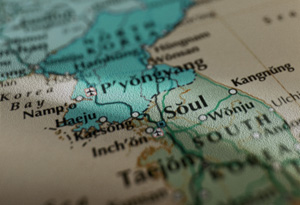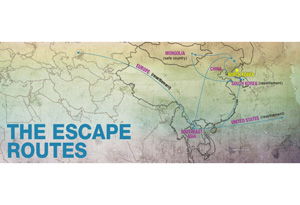The North Korea Crisis

Photo: © 2010 Thinkstock
North Korea is home to one of the world's most tragic yet ignored crises today. Government mismanagement of food has left 33 percent of the population undernourished; freedoms of speech, press, assembly, association, physical movement and religion are prohibited; and more than 200,000 "violators" are overworked, tortured, raped or executed in five political prison camps. In search for food, work and freedom, up to 300,000 North Koreans have fled to neighboring China, where more than 80 percent become trafficked and children become orphaned or "stateless" with no paperwork or protection. As refugees who must remain in hiding from Chinese authorities who will send them back to punishment or execution, North Koreans flee to Southeast Asia, where they seek friendlier countries that will grant their asylum or allow for their safe resettlement.

For well over a decade, hundreds of thousands have fled North Korea seeking basic necessities such as food and medicine or even freedom. It is estimated that up to 300,000 are hiding in the underground today. Similar to the Underground Railroad of 19th-century America that saved more than 30,000 slaves, the modern-day underground railroad comprises a network of safe houses and escape routes from North Korea to China, Mongolia, Russia and Southeast Asia. Refugees must traverse over mountains, deserts and other unfriendly terrains, and families are frequently separated during the journey in the underground. No outcome is ever certain.
Of the North Korean refugees who are hiding or have come through China, the majority are women, and more than 80 percent are trafficked or voluntarily marry Chinese men. Some of these women, however, leave their families for fear of being caught and sent back to North Korea or to escape abuse. Once the North Korean mothers leave, the Chinese fathers often find themselves struggling or unable to provide for their children, altogether abandoning these "stateless" children or leaving them to be cared for by relatives. Stateless children lack documentation that prove their citizenship and allow them to receive education, work legally or have basic rights, which leaves them at high risk of exploitation or abuse.
Of the North Korean refugees who are hiding or have come through China, the majority are women, and more than 80 percent are trafficked or voluntarily marry Chinese men. Some of these women, however, leave their families for fear of being caught and sent back to North Korea or to escape abuse. Once the North Korean mothers leave, the Chinese fathers often find themselves struggling or unable to provide for their children, altogether abandoning these "stateless" children or leaving them to be cared for by relatives. Stateless children lack documentation that prove their citizenship and allow them to receive education, work legally or have basic rights, which leaves them at high risk of exploitation or abuse.
More than 200,000 "violators" are overworked, tortured, raped or publicly executed in political prison camps across the country. Fourteen locations that have been condensed into five major prison camps—most verified by corroborating testimonies of North Korean defectors as well as satellite images. Entire families are imprisoned, including children, up to three generations, because a relative had committed a crime such as expressing disloyalty to the government. Conditions in the camps are alleged to be extremely harsh and systematic, and widespread human rights abuses occur. Most prisoners are not expected to survive such extreme conditions. Some reports have estimated that more than 400,000 prisoners may have already died in this system.
More than 1 million people perished in the devastating famine in the mid-1990s due to natural disasters, the collapse of the PDS (Public Distribution System) and gross government neglect and mismanagement. Thirty-three percent of the population is undernourished, 23 percent of children under the age of 5 are underweight, and a near-total breakdown in the public health system has left an entire generation of children physically and mentally impaired.
North Korea relies heavily on international food aid. Less than 23 percent of its land is arable, as farmers removed trees for food, resulting in deforestation, soil erosion, nutrient depletion and increased susceptibility to flooding. As of April 2010, North Korea's grain shortfall has been estimated at 1.3 million tons, and the World Food Programme has estimated that 6.2 million North Koreans are short of food.
Because of discriminatory food distribution and transparency issues, continuing food aid has been a challenge for many NGOs inside North Korea. Due to these issues and a decrease in donor support, World Food Programme may be forced to withdraw efforts by summer 2010.
North Korea relies heavily on international food aid. Less than 23 percent of its land is arable, as farmers removed trees for food, resulting in deforestation, soil erosion, nutrient depletion and increased susceptibility to flooding. As of April 2010, North Korea's grain shortfall has been estimated at 1.3 million tons, and the World Food Programme has estimated that 6.2 million North Koreans are short of food.
Because of discriminatory food distribution and transparency issues, continuing food aid has been a challenge for many NGOs inside North Korea. Due to these issues and a decrease in donor support, World Food Programme may be forced to withdraw efforts by summer 2010.
North Korea maintains labor contracts with countries through government entities and foreign firms. North Korean laborers who work under such arrangements are denied freedom of movement, and a large portion of their salaries are deposited into government accounts. There are an estimated 10,000 to 70,000 North Korean laborers worldwide, and many are subjected to harsh conditions in jobs involving construction and logging.
Although this is a complicated issue, there is hope. There are ways to help North Korean refugees who are hiding today and to use your voice to make a difference for the people living in North Korea.
LiNK, or Liberty in North Korea, is an international NGO devoted to the North Korean humanitarian and refugee crisis. LiNK provides protection and aid to North Korean refugees hiding in China and rescues refugees and helps them to reach freedom through a modern-day underground railroad through Southeast Asia. LiNK's global grassroots movement seeks to raise awareness of this crisis and provides a way for the international community to take part in bringing about effective change.
Here's how to get involved:
Rescuing Refugees
Through "TheHundred" campaign, we rescue North Korean refugees hiding in China and provide them with a way out. They are brought to safety to our shelter in Southeast Asia, where we protect and provide for them until their resettlement.
Support a Shelter
We support orphaned North Korean and stateless children in China, providing them with education, food, transportation and protection. In our Southeast Asia shelter, we assist refugees in their processing for resettlement to South Korea and the United States and begin preparing and educating them during their wait.
Resettlement
Through our "Liberty House" program, we provide educational and financial assistance, and case management services to North Korean refugees we have resettled in the United States and South Korea. Through our communities and networks, we invite them into our families as we also join them in their new lives.
Awareness
We raise awareness of the North Korean human rights and refugee crisis through national awareness tours and provide opportunities to be directly involved in the issue through our local chapters, which focus on raising awareness in local communities, advocating and fundraising for LiNK's programs.
Visit LinkGlobal.org for information and to donate.
LiNK, or Liberty in North Korea, is an international NGO devoted to the North Korean humanitarian and refugee crisis. LiNK provides protection and aid to North Korean refugees hiding in China and rescues refugees and helps them to reach freedom through a modern-day underground railroad through Southeast Asia. LiNK's global grassroots movement seeks to raise awareness of this crisis and provides a way for the international community to take part in bringing about effective change.
Here's how to get involved:
Rescuing Refugees
Through "TheHundred" campaign, we rescue North Korean refugees hiding in China and provide them with a way out. They are brought to safety to our shelter in Southeast Asia, where we protect and provide for them until their resettlement.
Support a Shelter
We support orphaned North Korean and stateless children in China, providing them with education, food, transportation and protection. In our Southeast Asia shelter, we assist refugees in their processing for resettlement to South Korea and the United States and begin preparing and educating them during their wait.
Resettlement
Through our "Liberty House" program, we provide educational and financial assistance, and case management services to North Korean refugees we have resettled in the United States and South Korea. Through our communities and networks, we invite them into our families as we also join them in their new lives.
Awareness
We raise awareness of the North Korean human rights and refugee crisis through national awareness tours and provide opportunities to be directly involved in the issue through our local chapters, which focus on raising awareness in local communities, advocating and fundraising for LiNK's programs.
Visit LinkGlobal.org for information and to donate.
Keep Reading
Please note that Harpo Productions, Inc., OWN: Oprah Winfrey Network, Discovery Communications LLC and their affiliated companies and entities have no affiliation with and do not endorse those entities or websites referenced above, which are provided solely as a courtesy. Please conduct your own independent investigation (including an investigation as to whether any contributions are tax deductible) before donating to any charity, project or organization. This information is provided for your reference only.






